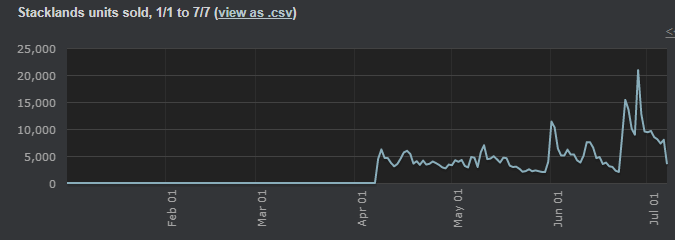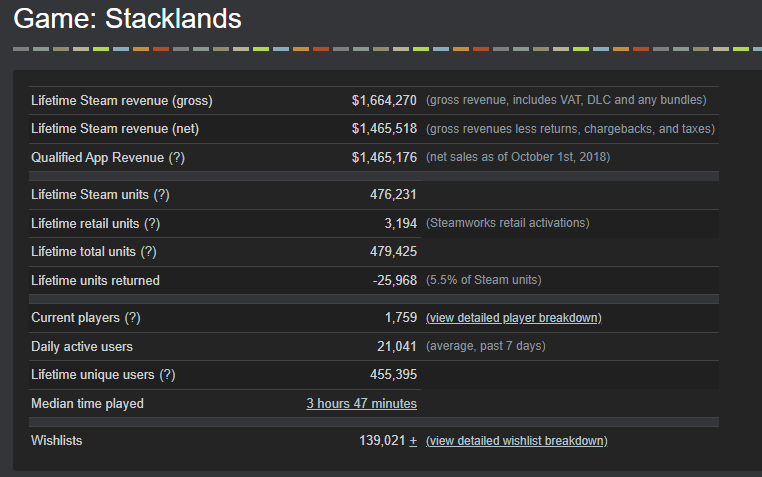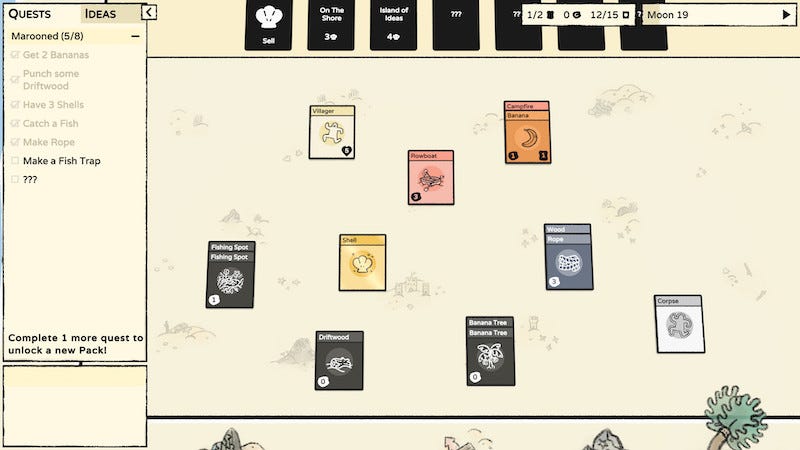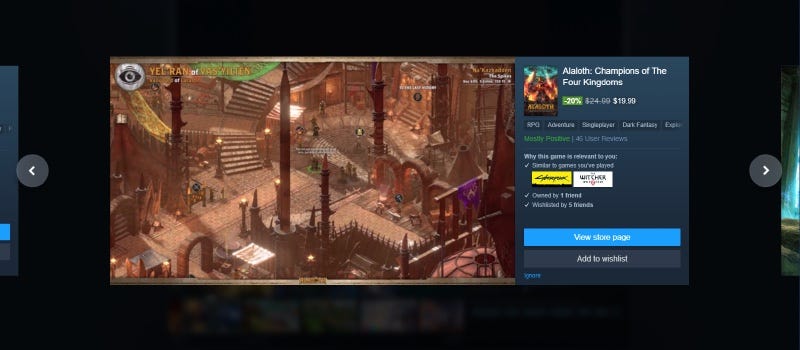How one of Sokpop's almost 100 (!) Steam games became a big hit
Publikováno: 11.7.2022
Sometimes there's strength in numbers, folks!
[The GameDiscoverCo game discovery newsletter is written by ‘how people find your game’ expert & company founder Simon Carless, and is a regular look at how people discover and buy video games in the 2020s.]
Welcome to another week in game discovery, kind subscribers! We’re excited to kick it off with data and insight from the folks at Sokpop Collective: a young group of devs with a unique biz model - and a recent breakout Steam hit, to boot.
Before we do, a couple of heads ups. Firstly, we’re off on holiday starting tomorrow. But we couldn’t leave you newsletter-less, so you will find three special ‘Summer Holiday’ free newsletters coming at you over the next 10 days. They’ll be… different. (Friday’s Plus-exclusive newsletters, co-written by Alejandro, will continue as normal.)
Talking of GameDiscoverCo Plus, you now have an extra 24 hours to get our 25% off Plus deal, to avoid awkwardness with ‘Monday’ timezones. Reminder: you get weekly ‘state of Steam’ newsletters, access to our Discord & data back end, and lots more:
Sokpop, Stacklands & the ‘vibe shift’ made real!
Adopting our semi-dispassionate, Watcher-like stance over the video game biz, sometimes we like to joke that there’s a ‘vibe shift’ coming. (Will anyone survive it, etc?) And there are certainly models of making games that make us feel, well, a bit old.
And the Sokpop Collective are definitely one of them! These four devs from the Netherlands have been written about quite a bit, thanks to their unique trick. They run a Patreon that you can sign up to for $3 a month, and get two games created by them to play, monthly. (They’re shipping ‘just’ 12 games per year nowadays - the other 12 are now games from their back catalog.)
Their Patreon is actually up to $8,500 per month now, from about $5k-$6k per month in the pandemic times. And that’s down to the smash Steam success of Stacklands (above), which we saw on our Plus‘most reviewed Steam games for the month’ data back in May (#93 for the month!) - and is also in the Top 100 (out of 75,000+ games!) in July.
So we reached out to Aran Koning at Sokpop, and he spilled the numbers: “Currently Stacklands has sold about 450k copies on Steam. We also sold about 50k copies of our ‘card-based village builder’ bundle including Stacklands & Simmiland, another popular game of ours.” Here’s the Stacklands graph since its April launch - check the sales curve:
And below is how Stacklands - “a village builder where you stack cards to collect food, build structures, and fight creatures”, made by Aran, with art by Lisa Mantel, has done so far, revenue & refund/DAU wise:
Looking at country base, China is the biggest single market for Stacklands, with 32% of the units sold there! This is followed by the U.S. (24%), France and Germany (5%) each, the UK (4%), and then Canada, Australia, Korea, and downwards from there.
Aran just posted a short video on Stacklands’ success, which talks about the design and psychology of making the title, why he thinks it hit big, as well as localization (“especially Chinese was really important”) - well worth 5 minutes of your time!
Stacklands is a $4.99 USD title to buy on Steam, and all of Sokpop’s games are between $3 and $5 USD. And it turns out a game going viral can have unexpected effects for others, according to Aran: “We also have a bundle that has every single Sokpop game in it, which is normally about $200. That one actually sold about 1,200 copies. We never really expected anyone to buy that, haha.”
Are there takeaways from Stacklands’ success?
So, you conventional game industry folks probably have a few questions about this. Like.. what the heck? If you’ve been struggling to ship a game in 2-3 years, how are these folks shipping 12 per year and getting big hits? Here’s some takeaways:
One small trick to ship so many games - Aran says: “Our 'secret' is that everyone in the collective makes their game completely on their own, so that essentially each of us has to make a new game every 4 months. That still isn't a lot of time, but it is a lot more do-able than having to ship every month.”
Steam was an important amplifier - For the first two years or so, Sokpop games weren’t on Steam: “We weren't sure if the hardcore Steam audience would be interested in our small games. There was also the issue of having to make a new Steam page every 2 weeks, and the annoyance of having to pay 100 bucks for every release. That held us back for a long time.” But after talking to Valve about it and setting up 70 Steam pages (!) for their back catalog, the team now near simul-ship to Itch and Steam - with Steam keys for Patreon subscribers.
Turns out Steam catalog revenue was worthwhile - Aran notes: “Since we started releasing our games on Steam [and before the Stacklands release] we've been earning about 50/50 between Steam and Patreon. So it essentially doubled our revenue.” So the cross-promotion and discovery boost was worth it, even before the hit happened. (Not to mention the Steam key ‘perceived value’ on Patreon.)
Sokpop takes the ‘one-concept game jam’ idea to extremes: this model is somewhat ‘commercialized game jam’, and all the Sokpop devs are both stylish and talented. So they get to try ideas - ‘turn-based tower defence with dice’,Souls-like starring bugs, solar system terraformer - in microcosm, show them to the Steam audience, and see what ‘sticks’. Fascinating.
Concluding, I will say that the tension between Sokpop’s ‘ship a game a month’ model and the necessity to spend longer on games might be increasing a bit. According to Patreon, several collective members have been delaying releases to improve them recently.
And Stacklands itself was a game that was put on the shelf for a while - until there was time to do it ‘properly’. Now it got popular? Aran says: “We're currently working on some free content updates, and after that we might release DLC.” And Sokpop’s Patreon supporters are fine with some deviation from the norm, like a Stacklands update instead of a new game - Aran says: “I like to think they're proud of us, haha.”
And I had one final question for the Sokpop Collective. Given it was Aran’s game that hit it big, how is the revenue apportioned? Well, like… a collective: “We split it evenly between the 4 of us. We've agreed to do this from the start, because we always felt like any of us could make a game that would randomly take off. This way we would increase our chances of earning enough to keep making games.”
So if there’s anything that makes you feel like a ‘vibe shift’ is in process, it’d be this: collective makes (almost) 100 games via crowdfunding, with equal founder pay. One of the creators makes a $5 game that starts grossing millions of dollars. The result? Still equal pay. We dig it, and it doesn’t feel much like the traditional game biz.
Some key sales milestones (and what they mean!)
So we’ve been piling up sales milestones for games, thanks to tips from Alejandro and another sales number ‘watcher’, Tomasety. Sometimes they can be a little contextless, though. So we wanted to run through them with some extra comments - like this:
Gunfire Reborn hit 2.5 million copies sold worldwide, showing that: well made co-op first-person looter shooters can still be fertile ground, even if you don’t have the Borderlands IP behind you.
NieR Automata made it to 6.5 million copies sold, showing that: for quality games, even premium ‘buy once’ ones, the long tail is still strong, with the game adding 1 million units sold in roughly the last year.
Core Keeper made it to 1 million copies sold on Steam, showing that: pixel art doesn’t stop great co-op sandbox adventure games from hitting it big. especially with crafting, farming, and mining all over the game design.
Fall Guys hit 50 million players in two weeks after a multiplatform launch and switch to F2P, showing that: a game that’s a big multiplayer hit at premium price point will be even more huge as F2P - see PUBG and other titles of recent.
Hardspace Shipbreaker reached 500,000 players, showing that: sophisticated single-player first-person games can still perform over time, especially with a successful 1.0 launch & a PC Game Pass boost. (We estimate nearly 100k PCGP players, btw, according to a method we’re excited to share more about soon.)
Squad has hit 3 million units sold and 190k DAU/26k CCU, showing that: tactical military multiplayer shooters are absolutely still huge - if you can nurture & grow a sufficiently sophisticated one. (Which is a big ask!)
Monster Hunter Rise: Sunbreak ‘shipped’ 2 million units in its first week, showing that: the ‘expensive DLC’ approach can really work if well-planned, and actually makes people go back to try the original game (which has now shipped 10 million units).
So that’s how we see it. Again, these numbers are - of course - outliers. But they are also milestones that we can all learn from. So we’ll keep reporting on them, with the correct context.
The game discovery news round-up..
Finishing out this newsletter’s breaking - or interesting - game discovery and platform news, we have a few things we’d like to run past you. Let’s see what’s hot to trot:
Breaking news: there’s a new Steam Labs experiment to improve the Discovery queue: “To date, 115 million players have used the Steam Discovery Queue, viewing a combined total of 18 billion game store pages. Today's update makes it easier to see key details about each game, and to flip through a queue of games faster than before.” Looks like the visuals/trailer are super important in this iteration - which is an experimental opt-in. (But I bet a tweaked version will roll out wide eventually.)
Want to know what Japanese indie devs think of the current game market? Asobu released its full survey results from its GDC 2022 talk. There’s some interesting stuff in here, particularly in the ‘What’s your biggest difficult in promoting your game overseas?’ answers.
PlayStation’s top downloaded games for June 2022 - across PS5and PS4 in the U.S./Canada & Europe - include new titles we’ve been tracking in Plus like Teenage Mutant Ninja Turtles: Shredder’s Revenge and The Quarry. (As well as a whole bunch of evergreens.)
Veteran PC dev Cliffski (Democracy 4) looked at his deep back catalog game sales, and found it slightly terrifying in places: Gratuitous Space Battles still made $9k net in the last year, but Gratuitous Tank Battles? $550 net on Steam for all of 2021. In other words: you need a pretty powerful old game to cut through the crud nowadays.
Looks like there was a one-off glitch with Steam hardware survey results in May 2022 which minimized Chinese users, and therefore boosted the reported % of VR users on Steam significantly. However, this has now been fixed, and UploadVR notes: “PC VR’s growth relative to the overall PC gaming market has continued to stagnate since the release of Half-Life: Alyx over two years ago.”
Love this Victoria Tran piece on failure and how to use it to most in a positive direction: “Success is built on the ruins of failures nobody else has seen, either because were not picked up by the public or they were forgotten about. Or at least, that’s what my successes have always looked like.”
Microlinks: PlayStation Store removes StudioCanal purchased movies from German & Austrian PSN libraries after service shutdown; Diablo Immortal is bringing in over $1 million a day in microtransactions; Firesquid & Hooded Horse are organizing a strategy game sale on Steam in September, for anyone wanting to submit.
Finally, Valve’s Claire Hummel showed off the fake Steam thumbnails - for 10 fairly funny non-games - that were part of the Steam Summer Sale ‘Clorthax’ ARG.

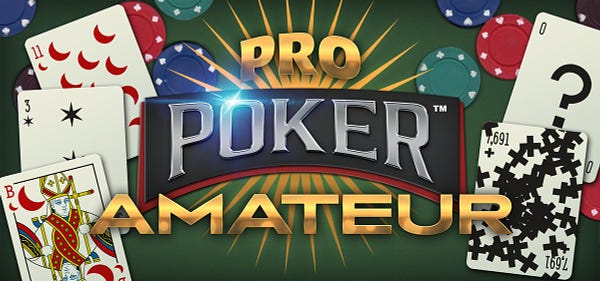
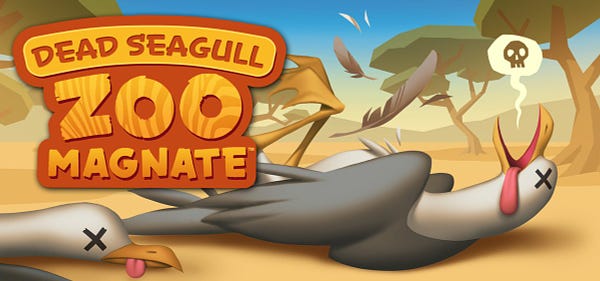
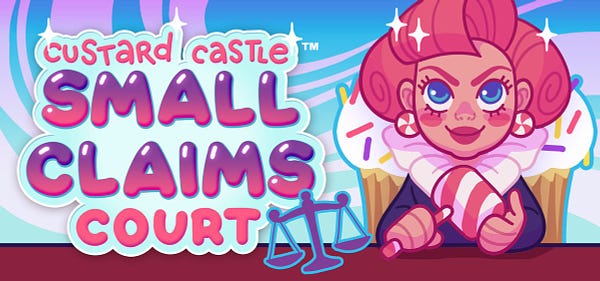
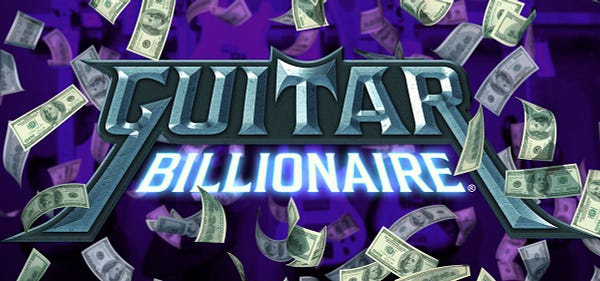
And that’s all we’ve got for now. We’ll be back on Wednesday for the first of our ‘Summer Holiday’ newsletters - see you then?
[We’re GameDiscoverCo, an agency based around one simple issue: how do players find, buy and enjoy your premium PC or console game? We run the newsletter you’re reading, and provide consulting services for publishers, funds, and other smart game industry folks.]
